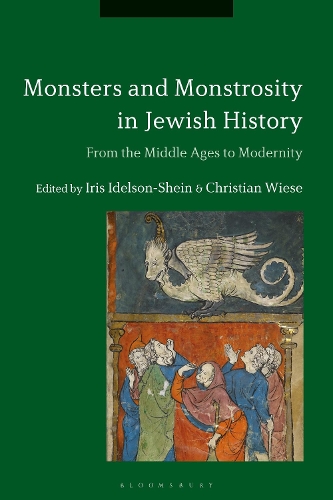
Monsters and Monstrosity in Jewish History: From the Middle Ages to Modernity
(Paperback)
Available Formats
Publishing Details
Monsters and Monstrosity in Jewish History: From the Middle Ages to Modernity
By (Author) Dr. Iris Idelson-Shein
Edited by Professor Christian Wiese
Bloomsbury Publishing PLC
Bloomsbury Academic
20th August 2020
United Kingdom
Classifications
Tertiary Education
Non Fiction
Mythical, legendary and supernatural beings, monsters and creatures
Cultural studies
Social and cultural history
Religion and science
909.04924
Physical Properties
Paperback
288
Width 154mm, Height 232mm, Spine 20mm
440g
Description
This is the first study of monstrosity in Jewish history from the Middle Ages to modernity. Drawing on Jewish history, literary studies, folklore, art history and the history of science, it examines both the historical depiction of Jews as monsters and the creative use of monstrous beings in Jewish culture. Jews have occupied a liminal position within European society and culture, being deeply immersed yet outsiders to it. For this reason, they were perceived in terms of otherness and were often represented as monstrous beings. However, at the same time, European Jews invoked, with tantalizing ubiquity, images of magical, terrifying and hybrid beings in their texts, art and folktales. These images were used by Jewish authors and artists to push back against their own identification as monstrous or diabolical and to tackle concerns about religious persecution, assimilation and acculturation, gender and sexuality, science and technology and the rise of antisemitism. Bringing together an impressive cast of contributors from around the world, this fascinating volume is an invaluable resource for academics, postgraduates and advanced undergraduates interested in Jewish studies, as well as the history of monsters.
Reviews
[An] excellent addition to the scholarly study of monsters Monsters and Monstrosity in Jewish History presents an engaging, multi-sided dialogue [This] book will be of interest to scholars of Judaism, medieval Europe, religion, film studies, art history, monster studies, and related disciplines. * Reading Religion *
An erudite and timely book. Emphasizing how the monster works within Jewish texts and images, how Jews themselves have often been made to function as monsters, and how the Jewish monster "stares back", this is a landmark work of scholarship. * Jeffrey J. Cohen, Dean of Humanities, Arizona State University, USA *
Idelson-Shein and Wiese - along with the volumes many other intrepid contributors - are the fields Van Helsings: monster-hunters, who, instead of proceeding with stakes and garlic, use the tools of cutting-edge scholarship to track down the traces of Jewish monstrosity in all its protean and subtle forms, and bring them into brilliant light. An endlessly stimulating volume. * Jeremy Dauber, Atran Professor of Yiddish Language, Literature and Culture and Director of Columbia's Institute of Israel and Jewish Studies, Columbia University, USA *
Reading the diverse collection of essays in Monsters and Monstrosity in Jewish History: From the Middle Ages to Modernity, I found myself at once educated, entertained...and alarmed. If the essays, taken together, show monsters and monstrosity to have been fluid categories over a millennium of Jewish history, they also show that the monster was not quite an empty signifier. Indeed, menacing monsters are today being empowered the world over by naive electorates. Despite the astounding popularity of Frankenstein and The Golem, their shared message seems unheeded: those who believe that a monster will serve its creators interests are tragically mistaken. This is my takeaway for today, but I would be remiss were I not to emphasize that the great achievement of this volume is its demonstration that by looking at the seemingly marginal topic of monsters and monstrosity in Jewish history, central and essential features of the historical landscape are illuminatedalbeit in black light! * Yossi Chajes, Senior Lecturer in Jewish History, University of Haifa, Israel. *
Author Bio
Iris Idelson-Shein is Gerda Henkel Research Fellow at Goethe University Frankfurt am Main, Germany. She is the author of Difference of a Different Kind: Jewish Constructions of Race During the Long Eighteenth Century (2014). Christian Wiese holds the Martin Buber Chair in Jewish Thought and Philosophy at Goethe University Frankfurt am Main, Germany. He is the editor, together with Cornelia Wilhelm, of American Jewry: Transcending the European Experience (Bloomsbury, 2016).
